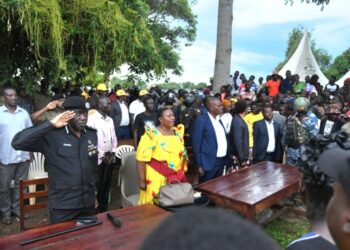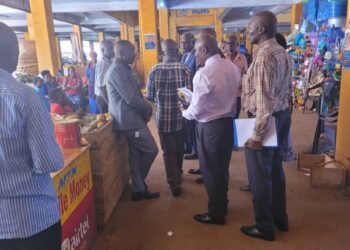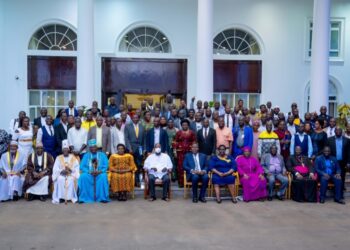By Irene Otto
At 26 years, Joyce Nakamya’s daughter has made 13 years. Joyce, became a mother when she was only 13 years old. Since then she has had to care, protect, teach and provide for her baby even if she were a child herself.
“I did not know what to do, it is my auntie who guided me on how to breastfeed the baby when I gave birth. I was myself a child but I had to grow up immediately,” says Joyce.
Her life has never been the same again. After her mother passed away, Joyce, had to work as a bar waitress to earn a living. She says that it is the, the bar owner, who got her pregnant and later denied the pregnancy, before chasing her from her job and taking her to police cells over alleged theft. She subsequently lost her job and had to go back to the village in Mukono, where she would deliver and parent her child.
Today, the COVID 19 pandemic lockdown has even made the situation worse. Joyce, lives in Banda, a Kampala slum, with her daughter in a small rented room. The daughter goes to a nearby school, which is closed. With no skill acquired having dropped out of school at 13, Joyce, has to do casual jobs like washing people’s clothes to earn a living. “It is not easy; I have rent to pay, school fees and food to buy and without a steady income during the COVID 19 pandemic lockdown, it is never easy,” narrates Joyce.
Joyce, is just one in very many young people who have been robbed of their childhood and education after being sexually abused. Many are grappling in such similar situations. According to the Uganda Demographic and Health survey, teen pregnancy is the number one cause of mortality for girls between the ages of 15 and 19 years. 24 percent of teenage girls aged 15 to 19 years are already mothers or pregnant with their first child, during the COVID 19 pandemic. While three out of 10 girls in Uganda drop out of school due to pregnancy related issues.
Thus, Reproductive Health Uganda (RHU) sought to help raise voices of teenage girls, young women, youth and children for their leaders to put them at the centre of new development agenda that would see such injustices as teenage pregnancy, school drop out and abuse of sexual and reproductive health rights (SRHR) come to an end.
With less than one month to end the 42 days lockdown, it is crucial that the upcoming Sustainable Development issues in Uganda address the needs of teenagers and youth.
A 14-year-old mother, identified as Grace Wacha, is breastfeeding her one- year-old baby in Ongako Sub-county in Omoro District. She was in primary five when government announced the Covid-19 lockdown in 2020.
Wacha, engaged in a relationship with a man who mysteriously disserted her, well knowing that he is not coming back to be with her during the lockdown and start up a family.
“He has deceived me for one year now without any help for up keep, treatment and starting up an income generating activity. After counseling from Reproductive Health Uganda (RHU), and courtesy of other Civil Society Organizations (CSO’s), I have made up my mind to go back to school,” recounts Wacha.
In Agwata village in Dokolo district, another 12-year-old girl, Brenda Wanichan, who gave birth during the lockdown at 11 years also through caesarean section, lives in discomfort. She was in primary three before the lockdown.
She is forced to plough the land to earn a living for her and the child, against the doctor’s advice to provide for her child. Her mother is disabled, diabetic and has hypertension. She cannot take care of the child. Wanichan, moves with her child since she lacks a caretaker to look for gardens to plough to earn some money.
While addressing teenage mothers and fathers in Hoima and Kikuube districts, the Technical Coordinator for Safe Motherhood Annet Kyarimpa, disclosed that mere counselling alone may not help the youthful mothers, but that organisations should support the girls to develop their lives mentally, physically and financially by avoiding early unwanted pregnancies by using family planning. All the teenage mothers have enrolled onto family planning and been counselled by experts about their sexual reproductive health rights (SRHR).
“These girls can be taken to the next level by supporting them in school or starting up livelihood projects for them so that they can enjoy life like other teenagers after enrolling onto family planning under the Advanced Family Planning initiative, United Nations Family Planning UKaid funded ACCESS project,” Annet Kyarimpa says.
Dr. Peter Ibembe, Director of Programmes at RHU says abuse of teenager’s sexual rights, which directly affects their Reproductive Health, education and livelihood must be stopped.
“the young generation need to be empowered through appropriate and deliberate education, to make the right decision and choice about SRHR issues, ” Dr. Ibembe says.
Several teenage girls got pregnant during the COVID 19 pandemic lockdown since March 2020. Some districts in Uganda like Gulu, reported more than 4000, while others were just above 500 in Kabarole,Lamwo and Mayuge districts.
Children Act. The children’s Act indicates that any person below the age of eighteen is a child. These are referred to as young people in the 2004 Uganda National Adolescent Health policy. Despite the existing legal definition of a child, a girl’s sexual maturation manifested by menstruation and the development of breasts in many communities are exploited to encourage or force teenage girls to marriage.
According to reports from agencies like Ministry of Health, ANPCCAN and RHU reports, more than 45 per cent of deliveries at health facilities in Acholi are of teenagers, who mainly dropped out of school.
The schools and district education officers also reported a drop in the number of Girls who returned to Schools after the lockdown was partially lifted. This directly tallies with the baby boom, reported between February and April 2021 in Uganda by the Ministry of Health.
Do you have a story in your community or an opinion to share with us: Email us at editorial@watchdoguganda.com













